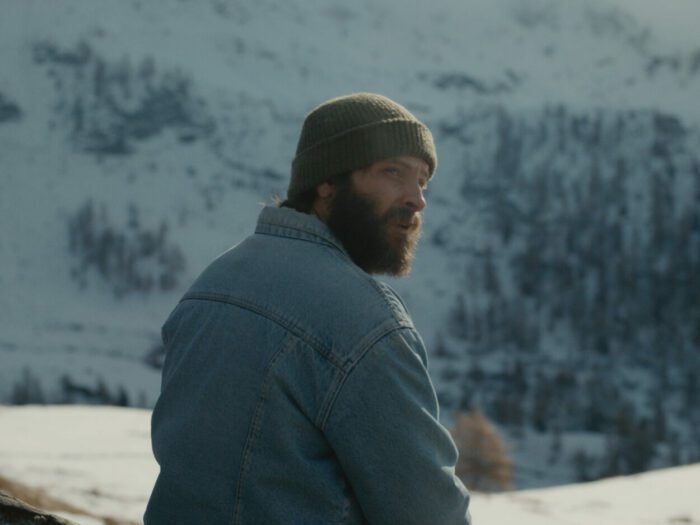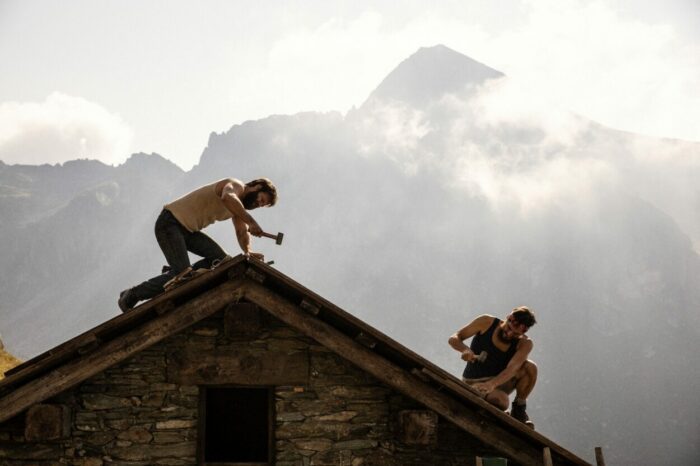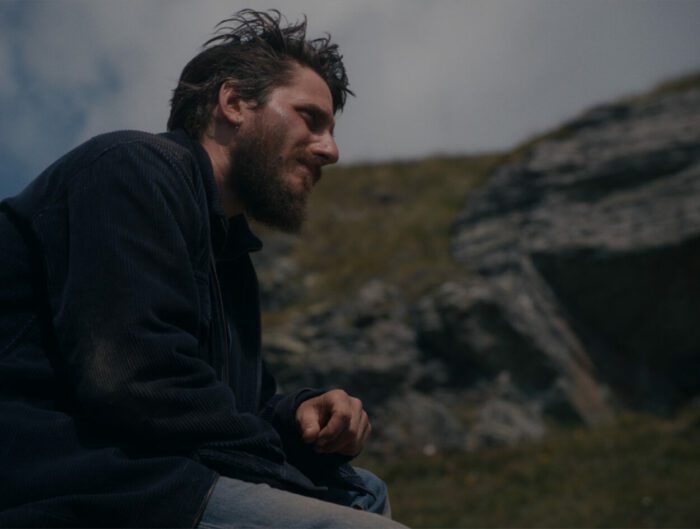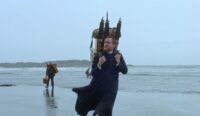The Eight Mountains, a 2022 Cannes Jury Prize Winner directed and adapted by Felix van Groeningen and Charlotte Vandermeersch from the Italian novella of the same name by Paolo Cognetti (Le otto montagne), is an epic tale of friendship, told in tiny moments and small gestures over the course of four decades in Northern Italy. Its stunning, breathtaking cinematography and gently persuasive performances combine for an extraordinarily intimate coming- and being-of-age story between two very different boys who become friends, and then, in very different ways, grown men.
Pietro (played first as a young boy by Lupo Barbiero) is the narrator, a young boy from from Milan whose parents (mother Francesca, played by Elena Lietti, and father Giovanni, played by Filippo Timi) take him each year to camp and hike at the base of the Italian Alps. Pietro is a small, keen, inquisitive boy whose asthma is challenged by the altitude and who chafes at his father’s robust physical activity: it’s a small crack in their relationship that grows to a crevasse over the years as little Pietro begins to resent his father’s long absences to manage his business. Pietro befriends Bruno (first played by Cristiano Sassella), a charming boy from the mountain village emotionally abandoned by his own father, and finds himself nonplussed when his own father seems to enjoy the rugged Bruno’s company over his own son’s, especially when taking on the challenge of climbing the treacherous Alpine mountainsides.
Pietro and Bruno grow apart during their teens (played briefly by Andrea Palma and Francesco Palombelli, respectively), going some 15 years without seeing each other. Pietro travels, studies, and works in restaurants, slowly making progress as the writer he hopes to become; Bruno is seen only briefly before the two reconnect in the wake of Giovanni’s death. The event triggers several surprises: the first is that Pietro (now and for the rest of the film played as an adult by Luca Marinelli) has been bequeathed a small plot of land and a decrepit, uninhabitable building high in the mountains; and the second is that, completely unbeknownst to him, his father and Bruno (now played by Alessandro Borghi) continued their hiking journeys together every year in the long interim. His father’s will essentially reunites the two lost friends atop the Alps in a new venture that will test and bond their lifelong friendship.
A cabin in the Alps was originally Giovanni’s dream, but it’s the skilled, hardworking Bruno who has the acumen and drive to bring it to fruition. He enlists Pietro and the two men work sunrise to sunset each day for months to tear down and reconstruct the tiny cabin. It’s a shared purpose that brings the two as close as two male friends can be, but it also illustrates their divergent and just-perhaps irreconcilable personalities. A man of the mountains, Bruno needs no one and nothing other than the land to sustain himself. His bushy beard and brusque manner befit his rugged mountain-man ethos. Yet he’s not without his own sensitivities, developed from the books he’s learned by himself to read and the stings suffered by his own father’s harsh rule. (No wonder, it seems, he preferred Pietro’s father Giovanni, a man of tact and respect for the mountains.)

Pietro’s wispy beard matches his own more willowy nature, always seeking out something, never fully content with where he is. His odd jobs, furtive intellect, and constant travel have taken him across Europe and South Asia, but he is content to spend the summer rebuilding the cabin and his lost friendship with Bruno, perhaps in an attempt to come to terms with his own failed relationship with his father. To build a cabin on the Alps is no small task—even to lead a donkey carrying a wheelbarrow up its rugged terrain is an exercise in peril—yet the two friends find for a time their shared purpose.

The cabin-building is successful. It seems to teach Pietro the value of working in nature, building with his own hands, and staying in one place. He finds and reads his father’s journals recounting the summer hikes with Bruno and realizes something of what he missed—and Bruno found—in their relationship. Bruno, meanwhile, learns from Pietro more of the world beyond and of the need for human companionship during these months spent realizing Giovanni’s dream.
Even so, forces continue to pull the two men apart, and back together. The less said about the film’s third act, as the two friends explore adulthood with and without each other, the better, except to say that The Eight Mountains offers as earnest, thoughtful, and contemplative a perspective on male friendship as I can imagine. It’s a tale told in an epic scope and in front of magnificent scenery, but it’s one mounted on small, discreet moments: an ill-chosen word, a brief hug, a drunken laugh, a contented sigh. Though nearly two-and-one-half hours long, compressing a timeline of some four decades length, its pace is quiet, stately, and measured, with some long ellipses allowing for a more leisurely trip through its breathtaking mountainsides. It’s an approach to adaptation that allows for a degree of fidelity to Cognetti’s source novel without sacrificing either events or perspective.

That Pietro narrates, in occasional voice-over, and remains the single character onscreen throughout, makes sense: he is of the two the more educated and intellectual. The cinematography, meanwhile, by Ruben Impens (Titane), is every bit up to the measure of the narrative. Shot predominantly in a shallow-focus, narrow aspect-ratio with the majesty of the mountaintops in the background, the visual design of The Eight Mountains is itself a wonder. (You will in fact wonder just how some of its stunning shots were captured.) Complementing the cinematography is a soundtrack consisting of a diverse array of cuts from Daniel Norgren, whose reclusive Scandinavian home-studio magic makes for a tender companion to several of the film’s key scenes, heightening the poignancy of their emotions without ever sentimentalizing or trivializing them. Songs like “Everything You Know Melts Away Like Snow” comment so precisely on the film’s imagery it may seem as if they were composed explicitly for it. (They weren’t.)
Marinelli and Borghi seem perfectly cast as the yearning intellect and self-contented mountain man, respectively: the two are keenly different from each other, yet just enough alike one another to convey a strong sense of comradeship. Marinelli is onscreen longer and provides the predominant perspective, but Borghi is not in the least slighted. The two men both come across as fully realized human beings with frailties and blind spots to equal their warmth and charm. Their performances are at the core of the The Eight Mountains—it is, after all, a narrative based on friendship and self-discovery—yet at the same time, the majesty of the mountain setting and the impeccable craft of the scriptwriters and filmmakers van Groeningen and Vandermeersch make the film a monumentally deep and moving cinematic experience.
The Eight Mountains is, simply, not to be missed.
Co-written and co-directed by Felix van Groeningen and Charlotte Vandermeersch and starring Luca Marinelli and Alessandro Borghi, The Eight Mountains premieres in New York April 28, 2023, with Los Angeles and other cities to follow. From Sideshow and Janus Films. In Italian with English subtitles, 147 minutes.



